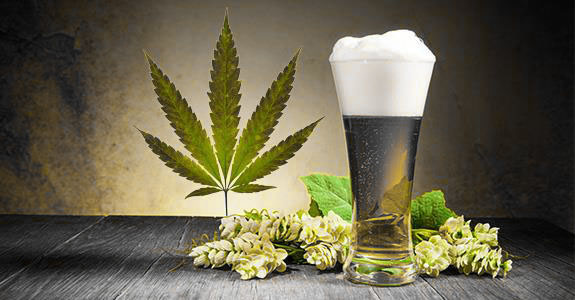Legalization of Cannabis Beer Production in Canada
With the start of legalization scheduled for July 1, it’s quite possible that, in addition to fresh buds, Canadians will soon be able to enjoy beer containing cannabis oils. Journalist Lauren Eads, writing for Drinkbusiness.com, reports that Province Brands (PB) has already patented the production of beer beverages made with cannabis plant extracts.
While many small regional companies in both the U.S. and Europe have already produced limited batches of beer with added cannabis, PB promises to launch mass production on a national and potentially international scale. Unlike their predecessors, the company plans to brew their beverages directly from cannabis plant material, not just by adding isolated extracts. In fact, the company has already come up with a slogan for its new product line: “Non-alcoholic, yet intoxicating.”
According to the future producers, cannabis beer will contain significantly fewer calories and less sugar than traditional hop-based beer. Additionally, unlike its alcoholic counterpart, the cannabis beverage will be gluten-free. According to Ms. Eads, the patent was officially recognized by Canadian authorities six months ago.
Besides PB, other liquor companies are also interested in entering the cannabis beer market, such as international giant Constellation Brands (CB), which acquired a stake in the cannabis company Canopy Growth in October of last year. Notably, purchasing a 10% controlling stake in one of Canada’s and the world’s largest cannabis firms cost CB $197.5 million.
According to PB’s CEO, Dooma Wendschuh, the entry of CB and other competitors has increased investor interest in cannabis beer, providing new sources of funding for his company. He also noted the irony that, in the end, it’s alcohol companies—not tobacco companies—competing for dominance in the legal cannabis market. In any case, Wendschuh believes that the interest from such major players only confirms the potential for cannabis beer’s future success.
First and foremost, Mr. Wendschuh hopes his company will be able to produce high-quality, great-tasting beverages. The company employs experienced experts with decades of experience in brewing and horticulture, who are developing a variety of cannabis beverage recipes. Their products will be strictly protected from reproduction thanks to a government patent.
Many companies acknowledge that Canada will serve as a testing ground for the concept of mass-producing cannabis beer before launching similar products in the U.S. Canada first surpassed the U.S. in cannabis reform 17 years ago, when the government allowed its cultivation and use for therapeutic purposes at the federal level. Now, the current Canadian administration promises to legalize recreational use, as well as commercial production and distribution, nationwide by early July this year—or by year’s end if the opposition manages to delay the legalization bill.
In addition to beer, both CB and PB plan to produce a wide range of non-alcoholic beverages with caffeine and various cannabis extracts. While Canadian authorities may only delay the reform, the U.S. government has not even legalized medical cannabis at the federal level, which has driven investors and entrepreneurs toward the Canadian market. Currently, 21 U.S. states have passed medical cannabis reforms, and another 8 states have fully legalized personal use, sale, and production. By the end of 2016, experts estimated the total profitability of the U.S. cannabis industry at $7 billion. If the market continues to grow at its current pace, its total value could exceed $50 billion by 2026.
Nevertheless, the U.S. administration is in no hurry to recognize the legal status of cannabis. Various federal agencies are doing everything possible to slow reform, particularly by hindering cooperation between cannabis companies and insurance or financial institutions. Additionally, U.S. Attorney General Jeff Sessions is known for his strong opposition to any form of cannabis reform. Cannabis remains on the list of strictly prohibited substances, alongside drugs like LSD, heroin, ecstasy, and methaqualone.
Mr. Sessions not only repealed the Cole Memorandum, which outlined the main principles of regional legalization, but also continues to claim that cannabis use is the source of the country’s drug addiction problems. He suggests that legalization has been the main reason for increased heroin and other hard drug use among the population.
Given these factors, it’s clear why most investors have chosen to put their money into the much more reliable Canadian cannabis market. In any case, it’s unlikely that the new Canadian cannabis beer will be legally available in the U.S. until the government formally legalizes the cannabis industry.



